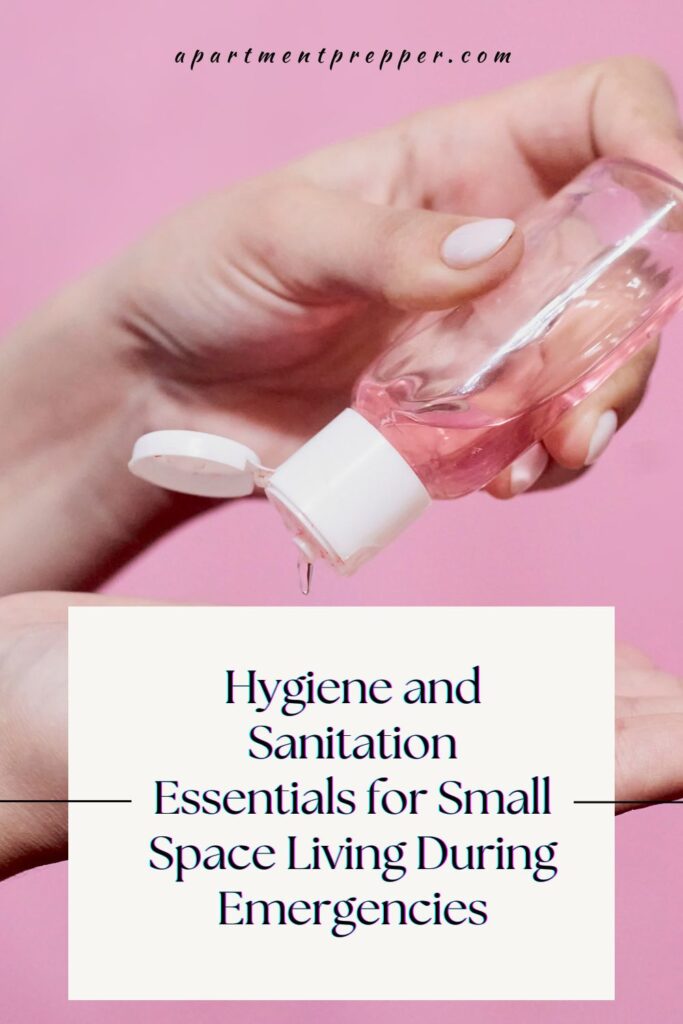Written by Bernie Carr
In a severe emergencies, water may become unavailable, which means you will have limited water to use for washing, bathing, cleaning or flushing. If you are not able to use the toilet, you will have to come up with alternate methods to handle waste. Maintaining hygiene and sanitation in small living environments becomes paramount for the well-being and safety of all occupants. Whether you find yourself in a compact apartment or a tiny urban dwelling, implementing practical strategies to conserve water, manage waste, and uphold cleanliness can significantly mitigate the risks associated with emergencies. In this guide, we’ll explore essential hygiene and sanitation essentials tailored specifically to small space living during crises.
Water conservation takes precedence in emergencies, particularly in small living spaces where storage capacity may be limited. Implement these practical tips to optimize water usage:
Limited Flushes: Reduce toilet flushes to conserve water, opting for “if it’s yellow, let it mellow” practices during non-urgent situations.
Efficient Dishwashing: Wash dishes in a basin rather than under running water, utilizing minimal water for rinsing.
No Showers: Avoid taking showers all together, or take short showers to minimize water consumption, turning off the faucet while lathering to conserve even more. Stock up on full body wipes to prepare for such an emergency. They’ll keep you clean until water starts running again.
Reuse Water: Repurpose greywater from activities such as dishwashing or bathing for flushing toilets or watering plants, ensuring no water goes to waste.
Waste Management: Keeping Spaces Clean and Hygienic
Effective waste management is imperative in maintaining sanitation standards, even in confined living spaces. Implement these waste management strategies to uphold cleanliness:
Segregation System: Establish a waste segregation system for proper disposal of recyclables, organic waste, and non-recyclable materials, optimizing limited space.
Compact Trash Bins: Utilize compact trash bins with secure lids to contain waste and prevent odors, emptying them regularly to maintain hygiene.
Composting: Explore composting options for organic waste, utilizing compost bins or vermicomposting systems to minimize landfill contribution and create nutrient-rich soil.
Staying Clean Without Traditional Facilities
In the absence of traditional facilities, maintaining personal hygiene becomes a creative endeavor in small living spaces. Employ these strategies to stay clean and refreshed:
Dry Shampoo and Wet Wipes: Utilize dry shampoo and wet wipes for quick and convenient hygiene maintenance, especially when access to showers is limited.
Portable Hygiene Products: Invest in portable hygiene products such as hand sanitizers, disinfectant wipes, and biodegradable soap sheets for on-the-go cleanliness.
DIY Handwashing Stations: Create DIY handwashing stations using portable containers, water dispensers, and biodegradable soap, ensuring accessible hygiene facilities within your living space.
Emergency Toilet Keep an emergency toilet and gel for waste. One reader told me she gave out potty buckets to her entire family for Christmas-see how she assembled them here. I’d also stock up on large heavy duty trash bags for emergency use.
Preparedness Through Knowledge and Practice
Ultimately, preparedness is key to effectively managing hygiene and sanitation in small living spaces during emergencies. Equip yourself with the knowledge and practice needed to navigate these challenges:
Education: Educate yourself and your family members on proper hygiene and sanitation practices, emphasizing the importance of cleanliness in preventing illness and disease transmission.
Practice Drills: Conduct practice drills to simulate emergency scenarios, incorporating hygiene and sanitation protocols into your evacuation plans to ensure seamless execution during crises.
Conclusion: Prioritizing Hygiene in Small Space Living
In conclusion, prioritizing hygiene and sanitation in small living spaces during emergencies necessitates resourcefulness, adaptability, and preparedness. By implementing water conservation techniques, effective waste management strategies, and creative hygiene solutions, you can uphold cleanliness and mitigate health risks even in the most confined environments. Empower yourself with knowledge, practice, and community collaboration to navigate emergencies with confidence and ensure the well-being of yourself and your loved ones.
We are an affiliate of Amazon.com, which means we received a small commission if you click through one of our Amazon links when you shop, at totally no cost to you. This helps keep the lights on at the blog. Thanks!
About the author
Bernie Carr is the founder of Apartment Prepper. She has written several books including the best-selling Prepper’s Pocket Guide, Jake and Miller’s Big Adventure, The Penny-Pinching Prepper and How to Prepare for Most Emergencies on a $50 a Month Budget. Bernie’s latest e-book, FRUGAL DIY has just been released on Amazon. Her work appears in sites such as the Allstate Blog and Clark.com, as well as print magazines such as Backwoods Survival Guide and Prepper Survival Guide. She has been featured in national publications such as Fox Business and Popular Mechanics. Learn more about Bernie here.
FB: https://www.facebook.com/apartmentprepper
Instagram: https://www.instagram.com/apartmentpreppers/
Twitter: https://twitter.com/AptPrepper
YouTube: https://www.youtube.com/channel/UC7vOtdbo-wiBeBxD6puCr1Q
Patreon: https://patreon.com/apartmentprepper
Pinterest: https://www.pinterest.com/aptprepper/
Today’s societal climate not supportive of prepping. With your help, we can keep bringing you content that is often suppressed. Help keep Apartment Prepper alive.
Join me on Patreon for ad-free content.

Or Help out via Paypal



